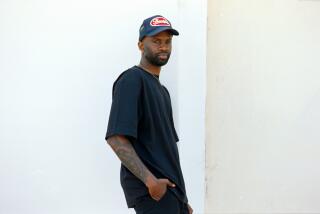The Day Was for Fathers
- Share via
On Father’s Day I get to do anything I want that is legal and nonviolent and doesn’t require a total abandonment of moral principles. I find that somewhat limiting but am willing to work within the rules because at least I don’t feel compelled to stay home and write.
I chose to meander on Sunday because that’s what I like doing best, other than eating the homemade corned beef hash at the Country Deli in Chatsworth. Under most circumstances, my wife Cinelli fidgets at the aimlessness of my routes, but Father’s Day is Father’s Day and it’s my right to drift.
Meandering can take me anywhere from Santa Barbara to Catalina Island, but on this day it took us floating like sticks in a tide up Wilshire Boulevard. That’s how we happened to end up at the Museum of the Holocaust in the Jewish Community Building.
This isn’t the big, high-tech, $50-million Simon Wiesenthal Center’s Museum of Tolerance that opened a few months back, but a quieter, more modest display of artifacts that chronicle the destruction of 6 million human beings by the Nazis during World War II.
Perhaps it was destiny or a subconscious directional indicator that led me to the Holocaust Museum, because I had been thinking of Father’s Day in more somber terms anyhow. The night before we had been to a small gathering of friends where the conversation among the men turned to the wars we had fought. The subject was the fathers that never were.
*
I realize it is not the intent of the day to dwell on those who never achieved fatherhood, but just thinking about it put me in a frame of mind to remember the young men who died on battlefields almost too distant in time to recall. One of them was Joe Citera.
He was from Greenpoint, Brooklyn, and wished for nothing more in life than to marry and raise a family and find a job that would feed them all. The dream died in a nothing war for a nothing cause on a nothing hill in Korea.
Joe was 19 when he was killed, and there were many like him who fought by my side a long time ago. They asked little of life but to live it, but were deprived of that by the calamity of conflict that tears flesh like paper from the pages of human history.
Most, like Joe, were too young to have children of their own. I mention him particularly because he talked about family the most, creating the perfect wife in his head and the fantasy sons and daughters they would someday have.
I also mention him because I think I saw him again in a photograph at the Holocaust Museum.
The museum itself is composed of pictures, videotapes and displays that chronicle a dark epoch a half-century ago. One of the photographs was that of a young man kneeling at the edge of a pit.
He reminded me a lot of Joe Citera, who always wore a kind of expectant, quizzical expression, as though he had just heard music almost out of range and was waiting to hear it again.
In the case of the young man at the pit, he was waiting not for music but for darkness. A Nazi soldier held a pistol to the back of his head.
*
I stared at the photograph a long time, hypnotized by the resemblance of the youth to Joe, until they merged into one entity, one face, one single metaphor of what we do to each other in the name of false and evil causes.
Did the young man at the edge of the pit dream, as Joe had, of children of his own running through the summers of their years until they ran out of sight over the horizons of passing time? Did he dream of grandchildren? Did he dream of growing old and wise and, at the end, of slipping gracefully into the patterns of the life he had left behind?
No one ought to die screaming, as Joe had, or die with a bullet in his brain and lie like human flotsam in a pit filled with the bodies of those who had never committed a cruelty. No one ought to, but they still are. Racial purity. Ethnic cleansing. Will we ever stop?
But it was never my intention to drag you into moroseness. The day came to sunset happily with me at the L.A. Zoo, surrounded by my own children, now grown, and their children--Travis, Shana, Nicole and little Jeffrey--in a scatter of fatherhood I have achieved through immense good fortune.
I’ll leave you there with the laughter of grandchildren lingering like wind chimes on the twilight of a gentle spring day, and apologize for the aimlessness of an essay that has taken us nowhere.
But then as I write it is still before midnight Sunday, and it’s my right to meander, even in print, and even about the children that were never born to the fathers that never were. I can do what I want. It’s still Father’s Day.
More to Read
The biggest entertainment stories
Get our big stories about Hollywood, film, television, music, arts, culture and more right in your inbox as soon as they publish.
You may occasionally receive promotional content from the Los Angeles Times.










